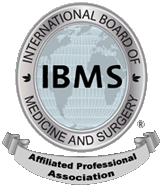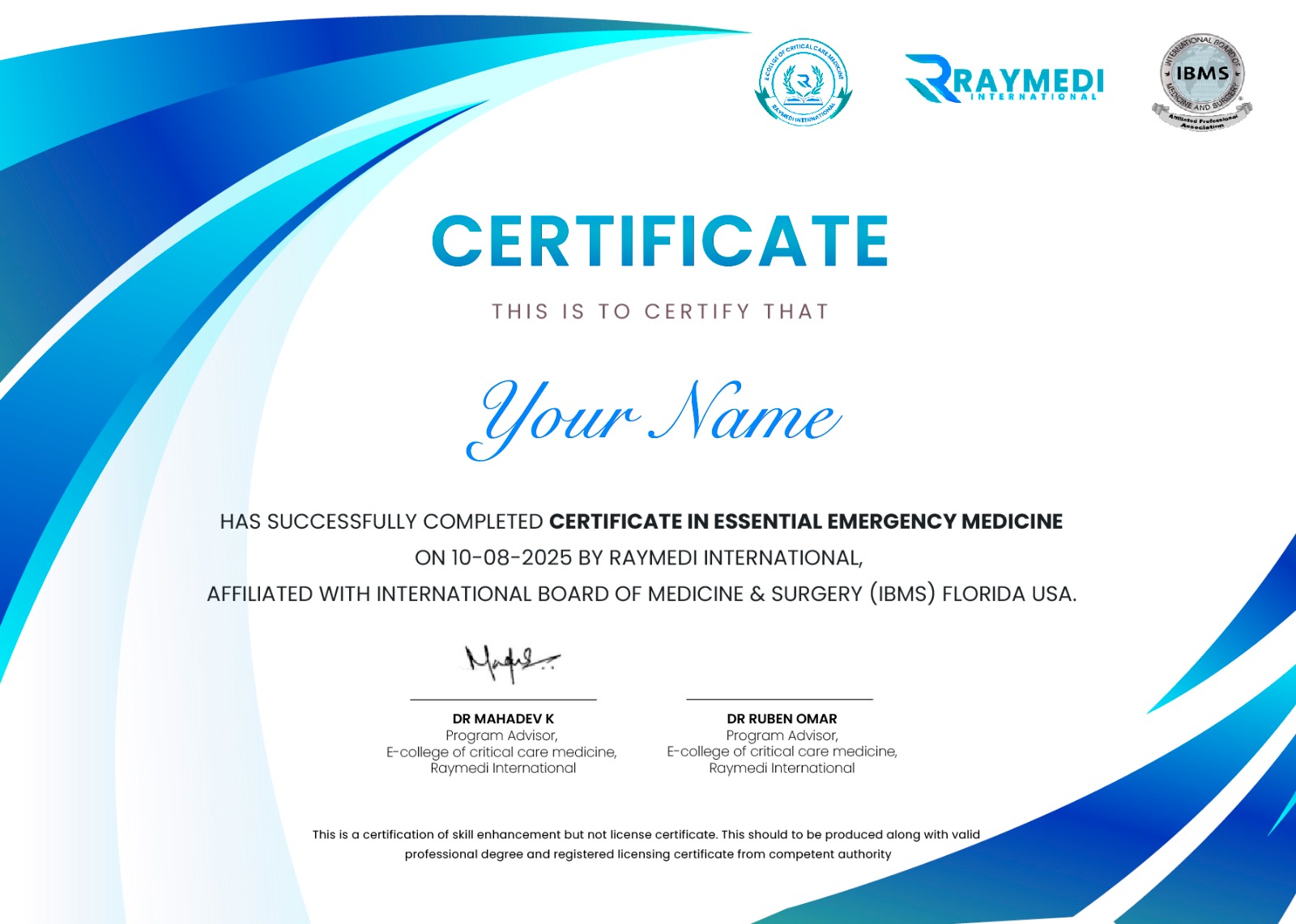Subtotal: ₹183,000.00
Course Curriculum
Airway Emergencies
-
01:20
-
Basic airway management
28:40 -
Anatomy and Pathophysiology of Airway
24:16 -
Basic Concepts of airway management in emergency department
28:40 -
Emergency Airway Principles – Part 1
18:32 -
Emergency Airway Principles -Part 2
10:28 -
Oxygen delivery devices and Bag Mask Ventilation
27:48 -
Drugs for Intubation and ventilation – Part 1
13:15 -
Drugs for Intubation and ventilation – Part 2
16:11 -
Endotracheal Intubation – Part 1
15:30 -
Endotracheal Intubation – Part 2
23:13 -
Assignment
Arterial Blood Gas Analysis
-
Preview
00:38 -
Arterial Blood Gas analysis
20:21 -
Respiratory Acid Base Disorders
31:22 -
Metabolic Acid Base Disorders
22:36
Acute Respiratory Failure
-
Pathophysiology of Pulmonary Gas Exchange
19:46 -
Determinants of Oxygenation and Ventilation
29:38 -
Non Invasive Ventilation
21:50 -
Invasive Ventilation
26:37 -
General Care of Ventilatory patient
31:41
Pulmonary Emergencies
-
Preview
00:38 -
Managing a Severe Bronchial Asthmatic – Part1
19:27 -
Managing a Severe Bronchial Asthmatic – Part 2
16:33 -
Managing Acute Exacerbation of Chronic Obstructive Pulmonary Diseases – Part 1
17:50 -
Managing Acute Exacerbation of Chronic Obstructive Pulmonary Diseases – Part 2
15:31 -
Managing Severe Community Acquired Pnemonia – Part 1
17:53 -
Managing Severe Community Acquired Pnemonia – Part 2
20:02 -
Managing Severe Hospital Acquired Pneumonia
15:20 -
Managing case of Acute Pulmonary Embolism – Part 1
22:07 -
Managing case of Acute Pulmonary Embolism – Part 2
19:13 -
Bedside Ultrasound lungs in Emergencies – Part 1
24:15 -
Bedside Ultrasound lungs in Emergencies – Part 2
27:22 -
Assignment
Cardiovascular Emergencies
-
Preview
00:38 -
Managing a patient in Shock !
31:40 -
Fluid Resuscitation in emergencies- Which one, How much? – Part 1
17:19 -
Fluid Resuscitation in emergencies- Which one, How much? – Part 2
17:05 -
Cardio-pulmonary Interaction
24:50 -
Managing Patient with Acute Heart failure – Part 1
29:56 -
Managing Patient with Acute Heart failure – Part 2
17:27 -
Managing Patient with Acute Heart failure – Part 3
20:48 -
Managing case of Acute Pulmonary Embolism – Part 1
22:07 -
Managing case of Acute Pulmonary Embolism – Part 2
19:13 -
Hypertensive Emergencies
30:09 -
ACS-STEMI – Part 1
22:28 -
ACS-STEMI – Part 2
36:11 -
ACS-NSTEMI – Part 1
20:26 -
ACS-NSTEMI – Part 2
23:29 -
Cardiogenic Shock – Part 1
19:04 -
Cardiogenic Shock – Part 2
22:47 -
Assignment
Neurological Emergencies
-
Preview
00:38 -
Assessing a Comatose patient – Part 1
15:56 -
Assessing a Comatose patient – Part 2
15:38 -
Managing Acute Stroke – Ischemic
23:43 -
Managing Acute Stroke – Haemorrhagic
26:45 -
Managing Status Epilepticus
22:21 -
Managing Neuroinfectious – Acute Meningitis and encephalitis – Part 1
20:35 -
Managing Neuroinfectious – Acute Meningitis and encephalitis – Part 2
10:39 -
Assignment
Toxicology and Traumatic Emergencies
-
Preview
00:38 -
Managing a poisoned patient
13:11 -
Spinal trauma – part 1
24:51 -
Spinal trauma – Part 2
25:56 -
Spinal trauma – Part 3
19:58 -
Managing a patient with BURNS – Part 1
24:37 -
Managing a patient with BURNS-Part 2
27:48 -
Assignment
Infectious Diseases & Critical care
-
Preview
00:38 -
Importance of Blood culture – Part1
35:03 -
Importance of Blood culture – Part 2
35:07 -
Rational Antibiotic Therapy- Part 1
20:30 -
Rational Antibiotic Therapy- Part 2
23:23 -
Managing Severe Community Acquired Pnemonia – Part 1
17:53 -
Managing Severe Community Acquired Pnemonia – Part 2
20:02 -
Approach to Nosocomial Infections – Part 1
22:40 -
Approach to Nosocomial Infections – Part 2
22:09 -
Approach to Nosocomial Infections – Part 3
14:36 -
Surgical Site Infections
40:42 -
Managing Neuroinfectious – Acute Meningitis and encephalitis – Part 1
20:35 -
Managing Neuroinfectious – Acute Meningitis and encephalitis – Part 2
10:39 -
Assignment
Abdomen emergencies
-
Preview
00:38 -
Upper Gastrointestinal Bleeding, Acute Pancreatitis
18:28 -
Gastro Hepatic Critical care – Part 2
21:12 -
Acute Renal Failure
15:20 -
Assignment
Other Emergencies
-
Preview
00:38 -
Managing DKA – Part 1
17:32 -
Managing DKA – Part 2
20:11 -
Managing Eclampsia – Part 1
25:00 -
Managing Eclampsia – Part 2
19:45
What I will learn?
- System wise modules - 10
- Total Video presentations - 78 each with 30 min duration
- Total Duration - 27 hours 45 mins
- Assignment at the end of each module
- Total credit points - 100 points
- Minimum credit points to be obtained - 80 points
- Then clear the final assessment examination - Theory & Practical
- Then receive CEEM Certificate.
Hi, Welcome back!
Frequently Asked Questions
Eligibility
MD/DNB Emergency Medicine,MRCEM,MBBS Graduates, MD Medicine/Chest/Anaesthesia, Diploma in Anaesthesia/Diploma in Chest diseases,DNB Medicine/Chest/Anaesthesia.In case of any doubt/controversy regarding the eligibility, you can reach us at info@raymediinernational.com.
Are the programs accredited?
Yes all our programs are accredited by the American Council of Training and Development.
How to get a Certificate in Essential Emergency Medicine from Raymedi International?
You need to enroll directly for CEEM. Submit the required documents, credentials will be shared by our technical team. Complete all the training modules, Clear the examination. On clearing the examination you will be receiving your e-certificate.
How to access the course material online?
To access the course, visit our website www.raymediinternational.com,click on the register button and fill up the form and attach all the necessary documents.Once registered, login using the login ID and password provided to you.You will be seeing a dashboard page which inturn routes you to the selected course module.
What to do if I'm unable to access the course after registration?
In case you have a problem accessing the course page, please write to us at info@raymediinternational.com. Our support team will assist you within 24 hours.
Is it a self-phased Learning Program?
Yes,it is.Since all the study materials are available online 24 /7, you can complete the course module anytime at your own phase.But since the whole duration of the course is 1 year,You have to finish the module within the said duration (i.e 1 year).Incase if you need extension please contact our support team @info@raymediinternational.com.
Do you get any license for practising critical care on pursuing Certificate in Essential emergency medicine ?
No. This is a skill-building program designed to enhance your critical care abilities; it does not, however, confer a license to practice critical care.
How long does my access to the course last?
You will have access to the program for 1-year duration.In case you need any extension please write to us @info@raymediinternational.com.
Do we get contact classes with the integrated course program?
Yes we do offer contact classes for most of our programs and in turn provide an opportunity to connect with subject experts and clarify your doubts.
Can more than one person access the course with a single license?
No. When you register for the program, you will be asked to agree to our terms and conditions which state that the license purchased will be applicable for single person use only.
Is this course recognized by MCI or any other U.S government bodies?
No. The Medical Council of India does not recognize or endorse any courses that are offered online. Raymedi International has been directly affiliated with the International Board of Medicine and surgery and With the collaboration and association of dedicated medical professionals who have proven expertise and experience, we have created a world-class digital infrastructure to train critical care aspirants.
Can Organization purchase multiple access /licenses for students or staff?
Yes. Organizations can purchase bulk licenses/access with good discounts. For this, you have to contact us at info@raymediinternational.com.
₹55,000.00
-
LevelExpert
-
CertificateCertificate of completion
0 (0 Ratings)
Accreditation & Affiliation

Sample Certificate











